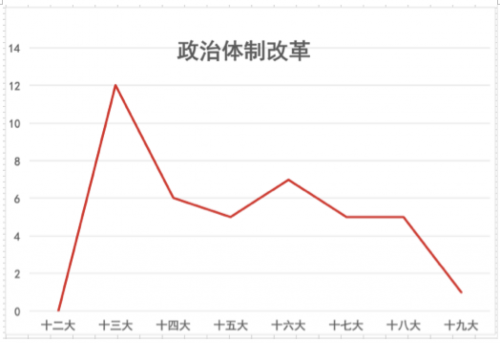Xi Jinping’s political report today to the 19th National Congress of the Chinese Communist Party was a long and drawn-out affair. There is a great deal of discourse to grapple with. But this is our initial take on some of the key points.
1. Xi Jinping’s “banner term,” the phrase that is meant to seal his legacy, is: “The Thought of New Era Socialism With Chinese Characteristics” (新时代中国特色社会主义思想). The history of what has been called “Deng San Ke” (邓三科), or the nod in key CCP political documents to “Deng Xiaoping,” the “Three Represents” (Jiang Zemin) and the “Scientific View of Development” (Hu Jintao), is also now apparently finished.
Since the 14th National Congress of the CCP in 1992, the opening of every political report — when it is declared at the outset what the main theme of the congress will be — makes mention of key banner terms and guiding thought (指导思想). At the 14th National Congress it was “Deng Xiaoping’s Thought of Building Socialism with Chinese Characteristics” (邓小平建设中国特色社会主义思想). At the 15th National Congress in 1997, it was “Deng Xiaoping Theory” (邓小平理论). At the 16th National Congress in 2002, it was “Deng Xiaoping Theory” and “The Important Thought of the Three Represents” (三个代表重要思想). At the 17th and 18th congresses, the “Scientific View of Development” was mentioned after mention of “Deng” and “San” — that is, after “Deng Xiaoping Theory and the “Three Represents.”
But with the 19th Congress today we see that the above chain of official terminologies, or tifa (提法), has been broken. Xi Jinping said today: “The theme of the congress is: not neglecting our original intent (不忘初心), steadfastly bearing in mind our mission (牢记使命), raising the great banner of socialism with Chinese characteristics, decisively achieving a comprehensively well-off society, seizing the great victory of new era socialism with Chinese characteristics (夺取新时代中国特色社会主义伟大胜利), struggling tirelessly to achieve the great rejuvenation of the Chinese people.”
Xi Jinping did not say that the conference would be guided by the “Deng San Ke” — by the ideas of his predecessors. In his report, he twice mentioned Marxism-Leninism and “Deng San Ke.” However, in the first case, this was to say that the Party, led by Marxism-Leninism and the “Deng San Ke,” had now “carried out arduous theoretical exploration, obtaining major new theoretical results for the emergence of The Thought of New Era Socialism With Chinese Characteristics.” In the second case, Xi said that, “The Thought of New Era Socialism With Chinese Characteristics is a continuation and development of Marxism-Leninism, Mao Zedong Thought, Deng Xiaoping Theory, the Important Thought of the Three Represents and the Scientific View of Development, a new achievement in the sinicization of Marxism, a crystallization of the collective knowledge and experiences of the Party and the people, an integral part of the theoretical system of socialism with Chinese characteristics, a compass for the whole Party and whole people in achieving the great rejuvenation of the Chinese people, and it must receive long-term support and constant development.”
That is a mouthful. But the important thing to recognize here is that the “Deng San Ke” is resolutely in the past. By contrast, “The Thought of New Era Socialism With Chinese Characteristics” is the here and now.
This new tifa, or official discourse phrase, was actually conveyed in slightly different language when other members of the Politburo Standing Committee, including Zhang Dejiang (张德江) and Yu Zhengsheng (俞正声), visited the various regional delegations. The phrase as it was used then was: “Xi Jinping’s Thought of New Era Socialism With Chinese Characteristics” (习近平新时代中国特色社会主义思想). Readers who in the past read our speculations about whether Xi Jinping would be “crowned” with his new banner term will remark the significance of this. Xi Jinping has, it seems, been crowned — but not yet as openly as he might be. In fact, it is very possible that in the future (how near we cannot say) this lengthy banner term will be shortened to “Xi Jinping Thought” (习近平思想), putting this general secretary on a level with Mao Zedong.
2. The phrase “political system reforms” (政治体制改革) has disappeared entirely from the section titles within the text of the political report.
From the 13th to the 16th reports, “political system reforms” did make the section titles, signifying a higher level of importance to the idea that the political reform should be an issue of priority. In the report to the 17th congress, the phrase disappeared from the section titles, but at the 18th congress it re-emerged. So here, once again, we discover that the phrase is gone.

The title of the sixth section of the political report to the 19th congress is “Fully Building a System of the People Serving as Their Own Masters, Developing Socialist Democratic Politics” (健全人民当家作主制度体系,发展社会主义民主政治). The phrase “political system reform” appears just once in the entire political report today, the lowest level ever if we count from the 13th congress in 1987.
3. In this report, we see no sign whatsoever of “ruling the country in accord with the constitution” (依宪治国) and “governing in accord with the constitution” (依宪执政).
These two phrases were raised by Xi Jinping in the first months of his leadership, and were regarded by some as signs that he harbored more liberal plans for political reform. In his speech commemorating the anniversary of China’s constitution on December 4, 2012, Xi Jinping used both phrases together: “Ruling the country in accord with the law first means ruling the country in accord with the constitution; the crux of governing in accord with the constitution is governing in accord with the constitution (依法治国首先是依宪治国,依宪执政关键是依宪执政). In 2014, publishing a collection of Xi Jinping’s important speeches in 2014, the Central Propaganda Department excised the constitution speech, a possible sign of ideological hardening. In September that year, Xi Jinping again used the phrases when commemorating the 60th anniversary of the formation of the National People’s Congress, but the phrases have rarely been used over the past two years. They now seem to be fading far into the past.




















